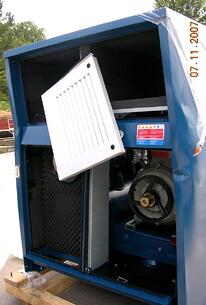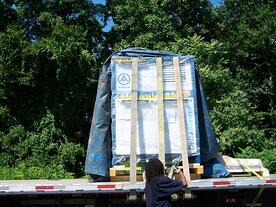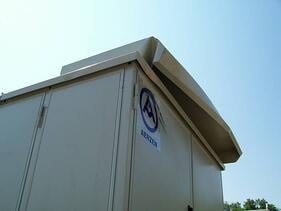Shipping damage is the top number one issue followed by scheduling and only then cost. It is amazing how much freight gets damaged per year. This is particularly true for new blower packages that are shipped via LTL (Less than truckload) and so called common carrier. Although deemed the most cost effective – expediting and broker companies managed to push the cost down - it is the most difficult way to get machinery to a job site undamaged. Because freight must be consolidated in the carrier’s main hubs the equipment must be moved often. The mostly heavy and odd shaped freight with uneven weight distribution is moved with fork trucks that are significantly undersized. Making things worse is the fact that logistics is a business model where people make Cents on a Dollar and thus the time freight spends in non value adding moving around within terminals is kept to an absolute minimum causing fork lift drivers to drive fast and furious. Freight gets shoved around, stacked (when it should not be) and dropped rapidly (giving drop-shipment a different meaning). The result is that sound enclosures, castings, instrumentation etc gets damaged significantly before it even makes it to the final destination.

Here is a brand new unit that was literally “drop shipped” – it fell off the lift truck during the off loading process at the job site.
FTL (Full truck load) shipments do not fare much better. Here the truckers often get completely carried away by putting the tie down straps way too tight on the sound enclosure roofs resulting in dented and crushed panels. Some leave with promising that they will tarp the freight when they get the next best change. You guessed right, this more often than not does not happen at all – now there may be rain and road water in places where this would normally never get to and now creates a major start up issue. Inexperienced drivers hit bridges and trees with the new equipment and some manage to completely drop the machines off the trailer.

Here the straps are being put on way too tight.

Here is a unit with “tree damage” – the unit was struck by a tree inroute to the site.
Addressing these issues cost a lot of money and most of all – time. You will not be able to use the blower or compressor for a while now that key components must be fixed. While most freight companies are pretty good about financial compensation, it still puts the burden on you the customer to make sure to either not take damaged freight off the truck, but at an absolute minimum make mention on the bill of lading that there is a problem with the freight. This helps alleviate the debate with the carrier later and speeds up the damage claim. Scheduling the pick up at our facility or even just making sure the correct truck shows up (needing a drop deck trailer when a regular one shows up makes for interesting calls) is often beset with issues. One example had a trucker show up no fewer than 5 days late because he had other drop offs to make. Is this worth the money that you thought you could save?
Best choice would be to let Aerzen handle the freight. Sure, sometimes this is more expensive, but we have aligned ourselves with people that will make sure your freight gets to the job site in the great shape you expected. The worst case had a good OEM of ours insist that his broker be used with the result that the very same blower packages were damaged twice and needed to make the trip toFloridathree times of which the last trip was with our house carrier. This is another life lesson of pay-me-now-or-pay-me-later.
Got a comment? Please drop me a note.
 AerzenUSA
AerzenUSA
Ralf Weiser
rweiser@aerzenusa.com
